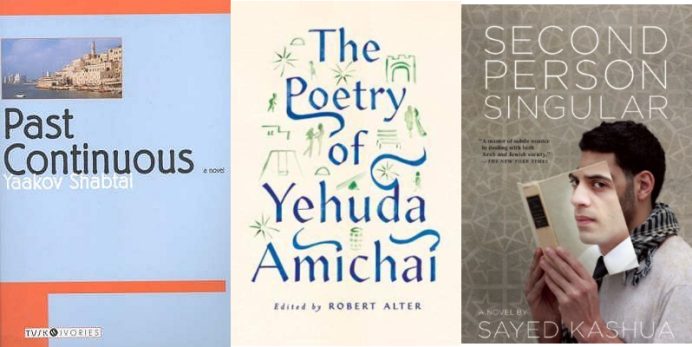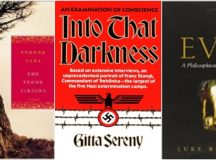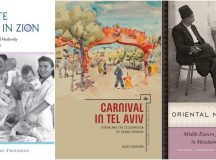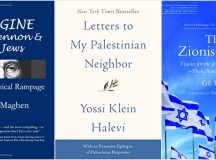Fathom is inviting experts to select their three favourite books on a theme or subject. The series began with Sara Hirschhorn on settlements and Gil Troy on Zionism. Here, Liam Hoare recommends his three favourite books by Israeli authors (not called Oz, Grossman or Yehoshua).
Israeli literature in translation has come to be defined by three writers: Amos Oz, David Grossman, and A.B. Yehoshua, the latter of whom died this June of cancer at the age of 85. Oz, Grossman, and Yehoshua have often been dubbed the ‘three tenors’ of Israeli literature, in spite of their contrasting styles and the fact that Grossman is not from the same generation of writers as Oz and Yehoshua. Their work has not only become an essential part of the canon of Hebrew literature, but books like A Tale of Love and Darkness (2002), See Under: Love (1986), and Mr. Mani (1990) are the works through which non-Hebrew-speaking readers see Israel and access the Israeli soul.
This speaks, of course, to the quality of Oz, Grossman, and Yehoshua’s writing, and my own love for Oz and appreciation for books like Fima (1991), The Yellow Wind (1987), and Early in the Summer of 1970 (1972) knows no bounds. It is a compliment to the craft of translators like Nicholas de Lange and Jessica Cohen who have rendered these works comprehensible to us while at the same time preserving these writers’ distinct voices. Hebrew novelists like Shai Agnon and Amalia Kahana-Carmon remain out of reach to us, either because their work was never translated in the case of the latter or, as with Agnon, the depth and beauty of his Hebrew makes the work of English translation nigh-on impossible.
For those who have read and prized A Tale of Love and Darkness, See Under: Love, and Mr. Mani, this list is a suggestion of what else is out there in terms of Hebrew literature in translation and where to turn next: from experimental fiction to poetry, graphic novels and police procedurals; from canonised works to modern classics.
Yaakov Shabtai, Past Continuous (1977)
In 1977, Yaakov Shabtai changed Israeli literature forever with the one and only novel published during his lifetime: Past Continuous. In the original Hebrew, the novel is written as a single unbroken paragraph running some 275 pages in length (though I should say that the English translation by Dalya Bilu breaks up the text into manageable sections). Past Continuous merges past with present, following the lives of Tel Aviv residents Goldman, Caesar, and Israel, all of whom are adrift and disenchanted in their own way and represent the lost souls of the sabra generation born of the pioneers who made aliya in the early years of the British Mandate.
A novel bookended by two deaths — that of Goldman’s father in the beginning and a suicide at the end — Shabtai’s universe is one riddled with death, decline, and decay, guilt and anxiety, inertia and purposelessness. Past Continuous captures a lost world, the Tel Aviv of the late 1970s, and gives voice to a collective nervous breakdown that was happening among the milieu about which Shabtai was writing: the austere pioneer generation that built the State of Israel and their wayward sons and daughters, whose light and power were fading. Past Continuous is, as I wrote for Fathom in 2020, a demanding, imperfect, and yet absolutely extraordinary novel.
Yehuda Amichai, The Poetry of Yehuda Amichai (2015)
Thanks to the great scholar of Hebrew literature Robert Alter, a broad swathe of the poet Yehuda Amichai’s work in translation is accessible to us via a single compendium, The Poetry of Yehuda Amichai, published in 2015. With the passage of time, Alter argues in his introduction to the volume, Amichai ‘seems more and more one of the great poets of the twentieth century’— someone who ‘effected a vernacular revolution in Hebrew verse, rejecting the high literary language and the rhetorical thrust of the previous generation of Hebrew poets and finding ways to make poetry out of the plain words of everyday speech’.
Amichai’s poetry gave us turns of phrase that became seared into the Israeli public consciousness: ‘From the place where we are right / flowers will never grow / in the spring’. Few wrote so beautifully and hauntingly about Jerusalem: ‘Jerusalem is built on the vaulted foundations / of a held-back scream’; ‘Jerusalem is a port city on the edge of eternity’; ‘Jerusalem. An operation that was left open’. He dealt not only with the everyday but also love and the tragedy of war— with, as Alter writes, ‘the anguish of living in a world of relentless armed conflict’: ‘God full of mercy / Were God not full of mercy / there would be mercy in the world, and not only in Him’.
Sayed Kashua, Second Person Singular (2010)
If the generation of writers that included Oz and Yehoshua, Shabtai, Amichai, and Kahana-Carmon changed both the style in which Israeli novels were written as well as their geographical boundaries, their heirs have broadened the very definition of what constitutes an ‘Israeli novel’. Today, there are writers like Ruby Namdar living in New York but writing in Hebrew or native Hebrew speakers like Shani Boianjiu and Omer Friedlander writing Israeli novels in English. Then there’s Sayed Kashua, who in novels like Second Person Singular (also published under the title Exposure) explores his divided self and the experience of being an Arab in Israel writing in Hebrew for a Jewish-Israeli readership.
Translated by Mitch Ginsburg, Second Person Singular is a thriller that centres on the intersection of two rather different lives: a lawyer who comes from a class Kashua describes as being ‘brokers between the noncitizen Arabs and the Israeli authorities, a few thousand people, living within Jerusalem but divorced from the locals among whom they reside’, and a social worker who takes on a job as a carer for a brain-damaged Jewish-Israeli in his twenties in order to occupy his nights and earn a little extra money. The joy of reading Second Person Singular is as much in the plot as the gradual unfolding of the twin identity crises that grip both lead characters.
Honourable Mentions
Yishai Sarid, The Memory Monster (2020), for writing one of the best Israeli novels of the last 10 years, a dark, funny, and subversive examination of the effects of historical memory.
Shani Boianjiu, The People of Forever Are Not Afraid (2012), for a debut novel that created a dialogue between English and Hebrew and blurred the line between fantasy and reality.
Rutu Modan, The Property (2013), for being what the writer and Fathom contributor Tal Kra-Oz once called a ‘one-woman industry’ in creating and publishing homegrown Israeli graphic novels.
Batya Gur, Murder on a Kibbutz (1991), for almost single-handedly turning the detective novel — hitherto a form of pulp fiction in Israel — into a serious literary pursuit.
S. Yizhar, Preliminaries (1992), for a luxurious, lyrical, late-in-life novel chronicling one child’s experience of the British Mandate in Palestine and the birth of a nation.




































